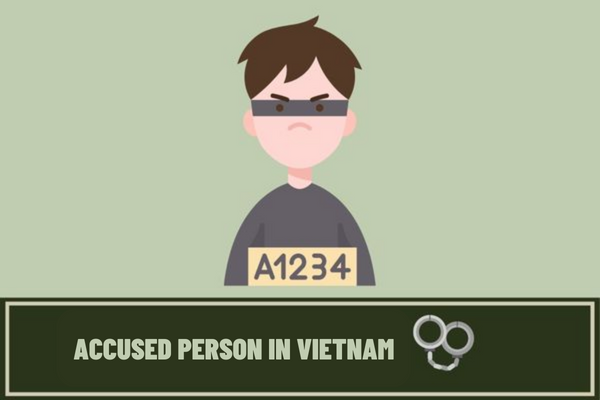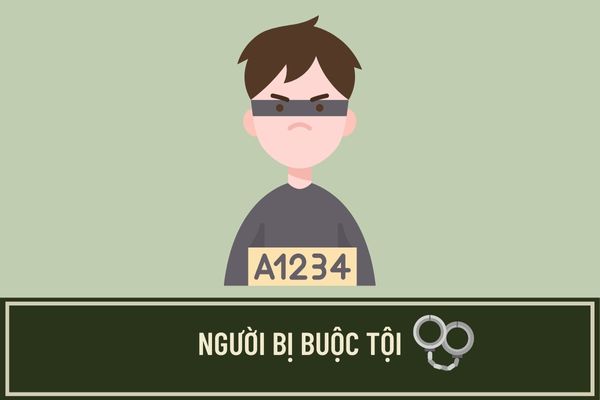What is the accused person in Vietnam? Is the accused person automatically considered a criminal?
Who is the accused person in Vietnam under current law?
Pursuant to Point dd, Clause 1, Article 4 of the 2015 Criminal Procedure Code of Vietnam:
Terminology
1. In this Law, words and phrases below are construed as follows:
...
dd) Accused persons include those arrest, detainees, suspects, defendants.
Thus, the accused persons include:
(1) Persons arrested in cases of arrest according to the provisions of the Criminal Procedure Code.
Specifically, including persons refers to emergency custody, arrest of perpetrators of crimes in flagrante or wanted fugitives, capture of suspects and defendants for detention, and arrest of persons for extradition according to the provisions of Clause 2 Article 109 of the 2015 Criminal Procedure Code of Vietnam.
(2) Temporary detainees are held in emergency captivity or arrested for criminal acts in flagrante or wanted notices or those confessing or surrendering and facing existing orders of temporary detainment according to the provisions of Clause 1, Article 59 of the 2015 Criminal Procedure Code of Vietnam.
(3) Suspects are physical persons or juridical persons facing criminal charges. The rights and duties of juridical persons as suspects are executed by their legal representatives according to Clause 1, Article 60 of the 2015 Criminal Procedure Code of Vietnam.
(4) Defendants are physical persons or juridical persons tried as per a Court’s decision. The rights and duties of defendants as suspects are executed by their legal representatives according to Clause 1, Article 61 of the 2015 Criminal Procedure Code of Vietnam.

What is the accused person in Vietnam? Is the accused person automatically considered a criminal?
Is the accused person automatically considered a criminal?
Pursuant to Article 13 of the 2015 Criminal Procedure Code of Vietnam stipulating presumption of innocence as follows:
Presumption of innocence
An accused person is deemed innocent until his guilt is evidenced according to the procedures and formalities as defined in this Law and a Court passes a valid conviction.
If grounds for conviction, as per the procedures and formalities in this Law, do not suffice, competent procedural authorities and persons shall adjudge the accused person to be not guilty.
Thus, according to the provisions, the accused person is deemed innocent until his guilt is evidenced according to the procedures and formalities as defined in the Criminal Procedure Code and a Court passes a valid conviction.
Therefore, the accused person is not automatically considered a criminal.
Who is responsible for proving and verifying that a person is a criminal? Is the accused person obliged to prove his innocence?
Pursuant to Article 15 of the 2015 Criminal Procedure Code of Vietnam stipulating as follows:
Determination of facts in a lawsuit
Competent procedural authorities are held liable for proving guilt. An accused person is entitled to but is not obliged to prove his innocence.
Competent procedural authorities, within their duties and authority, must use legitimate measures to determine the facts of a lawsuit in unbiased, thorough and complete ways, to clarify the evidences of guilt and innocence, aggravation and mitigation of criminal liabilities of the accused person.
Thus, the responsibility of proving the crime rests with the agency competent to conduct the proceedings.
Specifically, based on Clause 1, Article 34 of the 2015 Criminal Procedure Code of Vietnam and Clause 1, Article 35 of the 2015 Criminal Procedure Code of Vietnam, the obligation to prove the crime belongs to:
(1) Presiding authorities are:
- Investigation authorities;
- Procuracy;
- Court.
(2) The authorities assigned to perform certain activities of investigation are:
- Border protection force’s units;
- Customs authorities;
- Forest ranger’s units;
- Maritime police force’s units;
- Fisheries resources surveillances units;
- People’s police force’s units assigned to perform certain activities of investigation (referred to as units assigned to investigate);
- Other units in the People’s Army, as assigned to perform certain activities of investigation.
As for the accused person, the criminal procedure law clearly states that an accused person is entitled to but is not obliged to prove his innocence.
Thus, the accused person is not obliged to prove his innocence.
What is the attestation in criminal lawsuits in Vietnam?
Pursuant to Article 85 of the 2015 Criminal Procedure Code of Vietnam stipulating this issue as follows:
Attestation in criminal lawsuits in Vietnam
Competent procedural authorities, when investing, prosecuting and hearing criminal lawsuits must attest:
1. The existence of the crime, time, space and facts of the crime;
2. The perpetrator of the crime; the presence of guilt, intentional or unintentional acts; the existence of criminal capacity; purposes and motive of the crime;
3. Facts aggravating and mitigating criminal liabilities of suspects, defendants and identity traits of suspects and defendants;
4. Nature and severity of damages caused by the crime;
5. Reasons and conditions leading to the crime;
6. Other facts in connection with the exclusion or exemption of criminal liabilities and impunity.
Thus, competent procedural authorities, when investing, prosecuting and hearing criminal lawsuits must attest the above-mentioned issues.
LawNet
